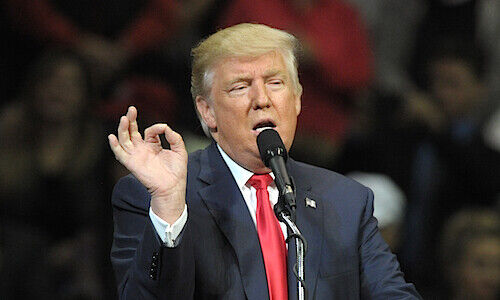Private Banks Call For Trimmed «Trump Trades»
With Joe Biden now officially out of the US presidential race, chances of a Republican sweep are believed to have lowered. This has led private banks to make a consensus call for at least a partial reversal of the so-called «Trump trades».
Following the withdrawal of Joe Biden from the US presidential race, market watchers are prescribing a lower level of certainty that the Republicans will win both the White House and Congress. As a result, private banks are forecasting at least some unwinding of «Trump trades» – investments that are aligned with the 45th President’s previous policies.
«We have seen some rotation toward ‘red' sectors and away from ‘blue' ones in recent weeks as recent momentum has favored the Republican party,» said UBS Global Wealth Management in a note, adding that its base case for the S&P 500 at end-2024 is around 5,900 despite expectations of volatility in the near term. «That could at least partially reverse in the coming days as markets parse the latest developments.»
Four Main Beneficiaries
According to Bank of Singapore’s chief economist Mansoor Mohi-uddin, there are four main trades financial markets have favored in anticipation of a victory by Donald Trump.
Firstly, inflation, Treasury yields and the US dollar are expected to rise as fiscal, trade and immigration policies would shift sharply. The US yield curve could also steepen if Trump pushes for low interest rates. Secondly, equities may benefit from lower taxes and regulation. Thirdly, increased political uncertainty would support gold. Lastly, oil prices may fall if Trump lifts restrictions on US drilling and sanctions on Russia.
«But unless the polls shift more sharply against Trump, we expect US yields, the USD and gold prices to stay firm,» Mohi-uddin noted. «We thus continue to see 10Y Treasury yields at 4.25 percent, gold reaching $2,500 and think investors should be neutral now on fixed income given the uncertain US political outlook for the rest of 2024.»
Active Management Required
As a result of the potential impact of sanctions, relocations and tariffs, active management is all the more relevant in the current environment to mitigate risks and prevent wealth destruction, according to Lombard Odier’s global chief investment officer Michael Strobaek.
«This stands in stark contrast to the trend towards passive investment,» Strobaek said in a note. «I also believe that portfolios can be made more resilient by including thematic allocations built on secular trends that transcend traditional regional and sectoral allocations. And as a new world order takes shape, investors need to be careful to anchor their portfolio allocations in assets and countries governed by the rule of law.»


























